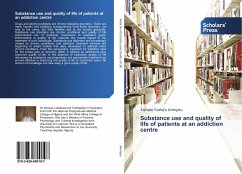Drugs and alcohol problems are chronic relapsing disorders. There are many harmful and disabling consequences from these disorders, not only to the users, but their families and to the society generally. Substance use disorders are chronic conditions and quality of life improvement are of particular importance to treatment goals. Improvement in quality of life captures the overall impact in the treatment of such individuals. Substance use disorders are increasingly viewed as chronic conditions, and addiction treatment services are beginning to adopt models that were developed to address other chronic conditions. From this perspective, treatment for addiction aims for the broad goal of recovery, which is defined as abstinence plus improved quality of life. In the absence of treatment, quality of life decreases as substance use progresses, but appropriate treatment has proved effective in improving the quality of life of substance users. No amount of knowledge can take away a good quality of life.
Bitte wählen Sie Ihr Anliegen aus.
Rechnungen
Retourenschein anfordern
Bestellstatus
Storno








